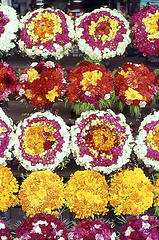Mopane worms:Â a traditional source of protein in Botswana. I’ve tried them. They’re yummie.
Some people don’t want to register their traditional knowledge
The ingratitude! Apparently villagers in the Uttar Kannada district of the Western Ghats in India have not been entirely truthful with the folks collecting information for the local Biodiversity Register. These registers have been promoted as a way of collecting local traditional knoweldge in order to protect against biopiracy and give local people some sort of intellectual property rights. But, like jealous cooks at a bake-off, some seem to withholding information.
“People have not given details of prescriptions, compositions and the methods used to cure ailments the traditional way using plants with medicinal properties. The information we have might be incomplete. In some cases, people have just mentioned plants but haven’t revealed how they use them for treatment.â€
That’s according to G M Bhatt, president of the Biodiversity Management Committee of Heggarni. Villagers say they fear that they will lose control of their knowledge and their resources, even if it is “protected” in a biodiversity register.
They may have a point. According to the report, when it was discovered that a local plant, Malabar tamarind (Garcinia gummigutta), contained a compound that could “cure obesity” it was rapidly overharvested and is now in short supply. (That could well be true; the GEF Small Grants Programme funds a project on the conservation and domestication of G. gummigutta.)
What I wonder is, where did villagers ever get the idea that their local resources might be open to overexploitation?
Moringa update
A comment on an ancient post about Moringa prompted two reactions. First, happiness that our page must be turning up in someone’s searches, tinged with sorrow that I don’t know of any financial partners to help protect the Congo basin with Moringa. Secondly, to ask what’s new with Moringa.
Not a lot at the site itself, but that’s probably because they’ve all been working to spread the word. And that word is that Moringa Leaf Powder is likely to be certified by the Food and Drug Board of Ghana, if they receive the necessary data. I hope that happens soon because it will offer an outlet and an income opportunity to all the people who have worked so hard to bring Moringa products to market.
But I confess I’m not all that happy myself with the designation of Moringa as “The Miracle Tree”. Sure it’s a good tree, and as Luigi said back then “really the adjective ‘multi-purpose’ could have been invented for this plant”. There’s all too much miracle silver-bullet style thinking around, and I would have hoped that, knowing the value of diversity better than anyone, the folks associated with Moringa would be less inclined to put all their eggs in one basket and all their faith in one tree.
Still, that’s quibbling. Snooping around on some other photos, I noticed the URL for the Environmental Development Youth Movement, which seems to be a key promoter of Moringa in Ghana. Fascinating site (especially if you like photographs of lots of packages) which has its own village and which seems to be doing good work. They’re looking for volunteers too. Say we sent you.
Photo by Armelle de Saint Sauveur
Floral glory
 A fascinating post over at Human Flower Project takes as its starting point the different cultural aesthetics associated with different styles of flower-arranging, from the all-encompassing European “one of everything” to the zen simplicity of Japanese ikebana. But that’s really all just throat-clearing prior to Julie’s rhapsodizing on flower bouquets in Afghanistan. She wonders what inspired the Afghan style, and whether it has survived. “[W]ith all that’s happened in the past three decades, do flowers in Afghanistan today look anything like Ard’s picture from the early 1970s? Can an aesthetic this original and strong survive thirty years of war?” good question. I have no idea.
A fascinating post over at Human Flower Project takes as its starting point the different cultural aesthetics associated with different styles of flower-arranging, from the all-encompassing European “one of everything” to the zen simplicity of Japanese ikebana. But that’s really all just throat-clearing prior to Julie’s rhapsodizing on flower bouquets in Afghanistan. She wonders what inspired the Afghan style, and whether it has survived. “[W]ith all that’s happened in the past three decades, do flowers in Afghanistan today look anything like Ard’s picture from the early 1970s? Can an aesthetic this original and strong survive thirty years of war?” good question. I have no idea.
Flickr photo by Ard Hesselink, used under a Creative Commons Licence.
Selling the idea of sorghum in southern Zambia
it is fair to say that most farmers in the Southern Province are extremely dissatisfied with growing maize. It fails to meet expectations, year after year, as erractic rainfall and localized droughts reduce yields. But maize is the only marketable crop for farmers (the government is the buyer), so they keep growing it even though payment times can be incredibly drawn out (some farmers have yet to be paid almost 6 months after harvest!) It’s a catch 22 that keeps rural households food insecure and low on cash. Sorghum, with its drought tolerance and available market can address these dissatisfactions.
This from a long and fascinating post — one of those first-hand field reports I find so interesting — from a worker with CARE in Zambia. Thulasy B. has some intriguing insights into the whole business of agricultural development, things that I have no experience of. She also has a blogroll that might be a goldmine for people interested in this area.